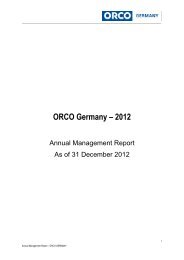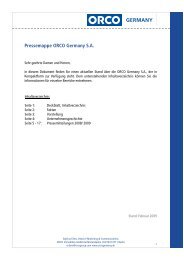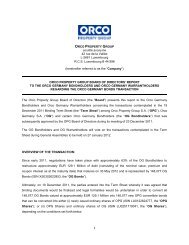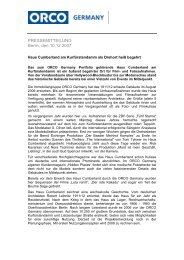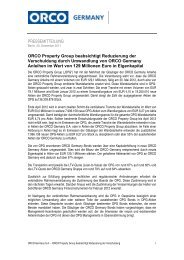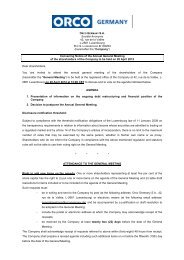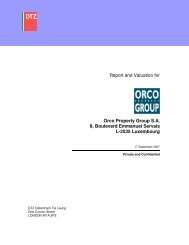You also want an ePaper? Increase the reach of your titles
YUMPU automatically turns print PDFs into web optimized ePapers that Google loves.
»<br />
»Kulturzeit« – presenter Andrea Meier (M) debated the issue of »Staging Urban Spaces« with Eike Becker, Meinhard von Gerkan, Hanns Zischerl, the artist Nikki S. Lee and Oliver Hirschbiegel.<br />
Just as certain settings can arouse such an emotional reaction, does<br />
architecture play such a major role in the emotional medium of film?<br />
There is no greater event in Berlin than the Berlinale. The ten-day<br />
international film festival lures both big movie stars and countless<br />
cinéastes from all over the world to Berlin and bathes the city<br />
in a glittering, cosmopolitan light. Those who only gawp at the<br />
red carpet and are satisfied with the whole »Oh, look, it’s George<br />
Clooney« spectacle, are missing the unique variety of the film festival,<br />
which makes it completely different to the other A-list festivals<br />
in Cannes and Venice. The films shown here are often less<br />
commercial and more radical in their statements, offering food for<br />
debate and exchange. This is what happened in spring 2007, when<br />
<strong>ORCO</strong> hosted a discussion event in cooperation with »Deutsche<br />
Kinemathek« on the fringe of the Berlinale, at which international<br />
guests debated the influence of film on the rest of the art world.<br />
At the heart of the event, which was called »Creation and Narration<br />
of Urban Spaces«, was the tension between cinema and architecture.<br />
The event set aside the usual seminar structure and got the<br />
debate off to a refreshing and relevant start by showing a restored<br />
version of the silent classic »People on Sunday«. The choice for<br />
kicking off couldn’t have been better. This outstanding work from<br />
<strong>Germany</strong>’s historic silent film era, made in 1929 by Robert Siodmak<br />
and Billy Wilder, tells the story of Berlin as a city, its architecture<br />
and the lives of its inhabitants. In semi-documentary style,<br />
»People on Sunday« shows four young people going about their<br />
daily lives in the vibrant metropolis of Berlin in the 1920s, demonstrating<br />
how later, thanks to the natural surroundings, they react<br />
much more freely when they go on a Sunday trip to Wannsee. In<br />
this way, »People on Sunday« poses questions that are still relevant<br />
to life in the city today.<br />
The follow-up expert panel discussion at Leipziger Platz on the<br />
subject of »Tension between creation and narration: the interweaving<br />
of architecture and film« was attended by the film director<br />
Oliver Hirschbiegel, the actor Hanns Zischler, the architects<br />
Meinhard von Gerkan and Eike Becker and the American conceptual<br />
artist Nikki Lee. Summarising, Oliver Hirschbiegel said: »It<br />
is astonishing how much of the Berlin that we saw in the film is<br />
still here« and he gave a succint description of what characterises<br />
Berlin’s architecture today. The ensuing discussion about staging<br />
urban spaces on film continuously revolved around the question<br />
of the interdependencies between film and architecture and how<br />
they mutually influence one another. Everyone agreed that film<br />
certainly has a great influence on our perception of architecture.<br />
As Hanns Zischler so aptly commented: »We often only truly perceive<br />
a space when we’ve seen it on film«. Hirschbiegel’s films are<br />
the best proof of this. As a director, he is known for narrowing<br />
spaces, making situations more intense. As he told the audience, it<br />
was important for him that in his latest work, Invasion, which premieres<br />
in autumn 2007, part of the story be told by the architecture.<br />
The director went on to say: »One can use architecture so well<br />
to express certain attitudes to life«. A no less interesting aspect was<br />
brought into play by the architect of Berlin’s new main railway station,<br />
Meinhard von Gerkan. He underlined the part played by the<br />
energy that fills a room. This energy can be created by past histories<br />
that have left their mark on a space, or it can be traces of a real life<br />
that are still evident. In this regard, Oliver Hirschbiegel related an<br />
interesting observation made during the filming of Downfall (Der<br />
Untergang): immediately after a scene in the reconstructed Führer<br />
bunker was in the can, the actors fled off the set. Just as certain settings<br />
can arouse an emotional reaction, does architecture play such<br />
a major role in the emotional medium of film? In Hirschbiegel’s<br />
view: »There are spaces that are so positively or negatively charged<br />
that one is consciously or unconsciously content or unhappy to be<br />
there, and this could be very clearly observed during the filming<br />
of Downfall«.<br />
The closing event, an extremely well-organized party with a<br />
roaring 1920s atmosphere, on the other hand, was definitely<br />
untainted by negatively charged architecture. The imposing<br />
rooms and the grand courtyard of the old building Ensemble at<br />
Fehrbelliner Strasse were appropriately furnished and lovingly<br />
decorated, to welcome around 1000 guests from the worlds of<br />
politics, culture and the media, who took over this unusual party<br />
location. Amongst the guests at the converted former factory<br />
were international celebrities such as Jeff Goldblum and homegrown<br />
upcoming talent such as Hannah Herzsprung, who together<br />
with German star actors Klaus J. Behrendt, Gaby Dohm<br />
and Katja Weitzenböck, partied into the small hours in the 1920s<br />
setting. And right at the end, the surprising realization that the<br />
cultural ability of architecture can indeed be planned. The experts<br />
at the panel discussion had been insisting exactly the opposite<br />
earlier in the day … but then, they don’t know it all.<br />
81



